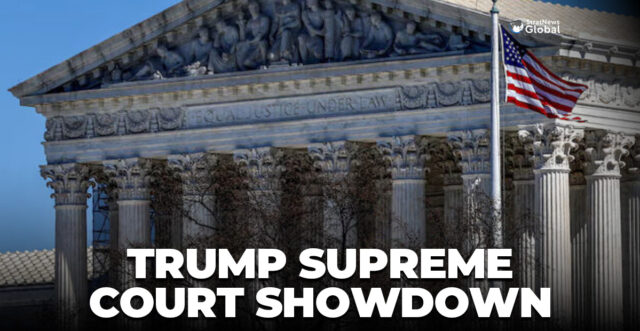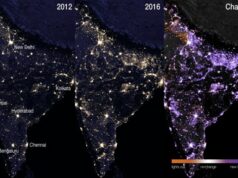President Donald Trump’s expansive assertions of executive power since returning to office could lead to U.S. Supreme Court battles.
Legal scholars note his actions, including attempts to restrict birthright citizenship, withhold congressional funding, and remove heads of independent agencies, signal a more assertive approach to presidential authority.
“The unifying theme is an extreme view of presidential power unlike anything we have seen before,” said Erwin Chemerinsky, dean of the University of California Berkeley School of Law.
Trump prevailed in three major cases last year at the Supreme Court, whose 6-3 conservative majority includes three justices – Neil Gorsuch, Brett Kavanaugh and Amy Coney Barrett – he appointed during his first term as president. The court has moved U.S. law steadily rightward with Trump’s picks on the bench.
“The Trump administration is gambling that the court won’t be an effective firewall, and the administration has decent odds on its side,” Harvard Law Professor Mark Tushnet said.
Trump’s actions, including hardline immigration measures, restrictions on transgender rights, and attempts to slash government agencies, have led to numerous lawsuits. These cases could reach the U.S. Supreme Court depending on the speed of appeals.
Critics argue Trump is overstepping his authority, bypassing Congress as outlined in the U.S. Constitution. Legal experts, like University of Illinois Chicago law professor Steve Schwinn, suggest that some of his actions, such as shutting down federal agencies and cutting appropriated funds, may be vulnerable to judicial invalidation.
“These efforts most clearly encroach on congressional authority, and are least obviously supportable by the president’s Article II powers,” Schwinn said, referring to the Constitution’s language delineating presidential authority.
Federal judges blocked Trump’s attempt to freeze federal funding, even after the White House rescinded its directive. Boston University School of Law professor Robert Tsai believe Trump would likely lose if the case reaches the Supreme Court, citing the Constitution’s separation of powers and previous court decisions.
“I can easily imagine five votes to brush him back on this,” Tsai said, referring to the majority threshold on the court.
Birthright Citizenship
Lower courts have indefinitely blocked Trump’s attempt to limit birthright citizenship, which would deny citizenship to children born in the U.S. to non-citizen parents. Plaintiffs argue the move violates the 14th Amendment. Scholars interviewed by Reuters suggest the Supreme Court will likely invalidate the action if it reaches them.
“I think that Trump will lose,” said John Yoo, who served as a Justice Department lawyer under Republican former President George W. Bush and is now a professor at UC Berkeley School of Law.
“The original understanding of the 14th Amendment, and subsequent Supreme Court opinions and government practice, require that everyone born in the United States become a citizen,” Yoo said.
Some scholars were less certain, predicting that at least some of the conservative justices might be open to narrowing the Supreme Court’s 1898 decision in a case called United States v. Wong Kim Ark. That ruling long has been understood to mean that children born in the United States to non-citizen parents are entitled to American citizenship.
Trump’s Justice Department has argued that the court’s ruling was narrower, applying to children whose parents had a “permanent domicile and residence in the United States”.
Cornell Law School professor Gautam Hans said, “I would hope that the Supreme Court would cleanly and categorically stop the birthright citizenship executive order, but I have learned better than to have confidence in this court.”
Hans said his view is that Trump’s actions in his first weeks in office pose a constitutional crisis representing “the greatest threat to American democracy since the Civil War” of 1861-1865, when states that allowed slavery rebelled.
“I feel a bit foolish in making such a sweeping claim, but I cannot think of another more dire moment,” Hans said.
A Conservative Court
Recent Supreme Court decisions favored conservatives, including rolling back abortion rights, expanding gun rights, and curbing federal agencies. In 2023, the Court granted Trump immunity after his indictment related to efforts to overturn the 2020 election, marking the first recognition of presidential immunity from prosecution.
For the Court to rule against Trump, at least two conservative justices would need to join the liberal justices. Over the next four years, Trump could make new lifetime appointments to the Court if vacancies arise. Some lower court judges have expressed concern over Trump’s expansive view of presidential authority.
U.S. District Judge John Coughenour criticized Trump, stating that the president views the rule of law as an obstacle to his policy goals. Coughenour issued a nationwide injunction against Trump’s stance on birthright citizenship. Trump’s administration has filed to appeal the decision.
A 1935 Precedent
Scholars suggest Trump could win some disputes over his executive orders at the Supreme Court. One case involves his firing of a National Labor Relations Board member, which could challenge the 1935 precedent in Humphrey’s Executor v. United States, limiting a president’s power to remove certain agency heads. Some justices have hinted at revisiting or overturning this ruling.
“Given what a majority of the court has recently said about Humphrey’s Executor, Trump might win,” Tushnet said.
Yoo said that Trump’s efforts to eliminate diversity, equity and inclusion policies from government operations are the “most secure” among the president’s executive actions being challenged.
“If past presidents could establish DEI and affirmative action in government offices, then the current president can eliminate the programs,” Yoo added.
Yoo noted that Trump’s early actions in office reflect a broad view of executive power, drawing on precedents from times of crisis in U.S. history. For example, Trump declared a national emergency over illegal immigration at the U.S.-Mexico border, though critics question if the situation justifies such a move. Yoo emphasized that presidential power expands in emergencies, as envisioned by the framers of the Constitution, but the key issue is whether the U.S. is truly in an emergency.
(With inputs from Reuters)





